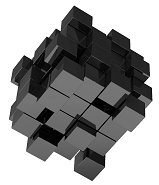 |

|
Content Owner: Herman Rutten | ||||
Summary
Virtual Storage Controller
Details
The Pivot 3 Virtual Storage Controller is deployed as a pre-configured Virtual Machine on top of each server that acts as a part of the Pivot3 Acuity storage solution and commits its internal storage to the shared resource pool. The Virtual Storage Controller (VSC) can be configured direct access to the physical disks, so the hypervisor is not impeding the I/O flow. Pivot3 leverages its patented MPIO driver and VMwares DirectPath I/O framework to maximize storage performance.
MPIO Driver: Pivot3 has a patented MPIO driver in Acuity that allows an application server to see and, more importantly, read and write down every path available to the data. This improves both performance and storage resiliency.
DirectPath I/O (VMDirectPath) is a VMware framework that allows Acuity to directly communicate with the
underlying storage controllers, NVMe devices and disks for optimal performance benefit. Pivot3’s patented implementation against this framework allows for improved overall I/O performance for the
application layer and VMs.
Kernel Integrated, Virtual Controller and VIB are each distributed architectures, having one active component per virtualization host that work together as a group. All three architectures are capable of delivering a complete set of storage services and good performance. Kernel Integrated solutions reside within the protected lower layer, VIBs reside just above the protected kernel layer, and Virtual Controller solutions reside in the upper user layer. This makes Virtual Controller solutions somewhat more prone to external actions (eg. most VSCs do not like snapshots). On the other hand Kernel Integrated solutions are less flexible because a new version requires the upgrade of the entire hypervisor platform. VIBs have the middle-ground, as they provide more flexibility than kernel integrated solutions and remain relatively shielded from the user level.
MPIO Driver: Pivot3 has a patented MPIO driver in Acuity that allows an application server to see and, more importantly, read and write down every path available to the data. This improves both performance and storage resiliency.
DirectPath I/O (VMDirectPath) is a VMware framework that allows Acuity to directly communicate with the
underlying storage controllers, NVMe devices and disks for optimal performance benefit. Pivot3’s patented implementation against this framework allows for improved overall I/O performance for the
application layer and VMs.
Kernel Integrated, Virtual Controller and VIB are each distributed architectures, having one active component per virtualization host that work together as a group. All three architectures are capable of delivering a complete set of storage services and good performance. Kernel Integrated solutions reside within the protected lower layer, VIBs reside just above the protected kernel layer, and Virtual Controller solutions reside in the upper user layer. This makes Virtual Controller solutions somewhat more prone to external actions (eg. most VSCs do not like snapshots). On the other hand Kernel Integrated solutions are less flexible because a new version requires the upgrade of the entire hypervisor platform. VIBs have the middle-ground, as they provide more flexibility than kernel integrated solutions and remain relatively shielded from the user level.
